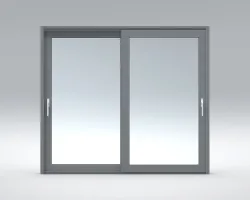Lift and slide doors and normal sliding doors are both popular choices for connecting indoor and outdoor spaces, but they differ in terms of their operation, design, and functionality. Here are the key differences between lift and slide doors and normal sliding doors:
Operation:
Lift and Slide Doors: Lift and slide doors are designed with a specialized mechanism that allows the door panel to be lifted slightly off the track for easy movement. This lifting action reduces friction, making it effortless to slide the door open or closed. Once the door is in the desired position, it can be lowered, creating a secure seal. This lift-and-slide mechanism is particularly beneficial for large and heavy doors.
Normal Sliding Doors: Normal sliding doors operate on a simple sliding track. The door panels move horizontally along the track when pushed or pulled. Unlike lift and slide doors, they don't have a lifting mechanism, and the sliding action may require more effort, especially for larger and heavier doors.
Sealing and Insulation:
Lift and Slide Doors: Lift and slide doors typically provide a superior seal when closed. The lifting mechanism allows the door to compress tightly against weather seals, minimizing drafts and enhancing insulation. This makes lift and slide doors an excellent choice for locations with harsh weather conditions.
Normal Sliding Doors: While normal sliding doors can provide adequate sealing, they may not achieve the same level of air-tightness and insulation as lift and slide doors. The absence of a lifting mechanism may result in a slightly looser fit when the door is closed.

Size and Weight Capacity:
Lift and Slide Doors: Lift and slide glass doors are well-suited for larger and heavier door panels. The lifting mechanism reduces the resistance, allowing for smooth operation even with substantial door sizes. This makes lift and slide doors an ideal choice for expansive openings and panoramic views.
Normal Sliding Doors: Normal sliding doors are suitable for standard-sized openings and lighter door panels. While advancements in design and technology have allowed for larger sliding doors, they may not be as practical for extremely large or heavy doors as lift and slide mechanisms.
Aesthetics and Design:
Lift and Slide Doors: Lift and slide doors often feature a sleek and modern design. The lifting mechanism allows for a cleaner appearance, with minimal hardware visible. This design aesthetic is favored in contemporary architectural styles.
Normal Sliding Doors: Normal sliding doors may have more visible hardware, including handles and locks. While they can still offer a stylish and functional design, the overall look may be perceived as more traditional compared to the minimalist appearance of lift and slide doors.
In summary, the choice between lift and slide doors and normal sliding doors depends on factors such as door size, desired aesthetics, and the importance of a tight seal and insulation. Lift and slide doors excel in larger and heavier applications, providing a seamless and energy-efficient solution for connecting indoor and outdoor spaces. Normal sliding doors remain a practical choice for standard-sized openings and those seeking a more traditional design.




Comments
Please Join Us to post.
0